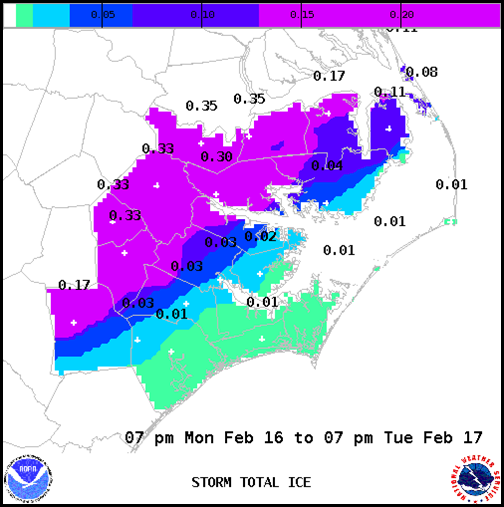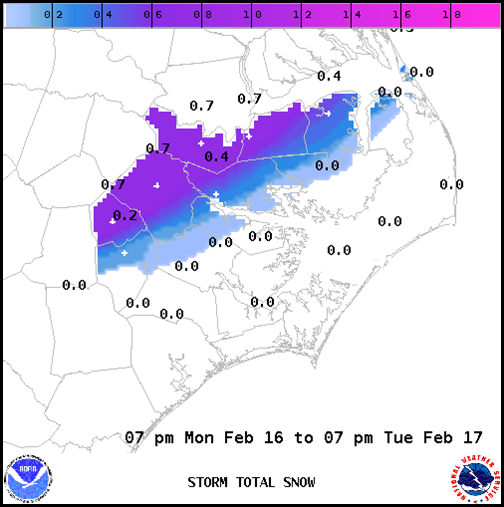Wintry Precipitation Event, February 16-17, 2015
Summary
Low pressure tracked across the northern Gulf Coast states, then across central Georgia and South Carolina and off the North Carolina coast near Wilmington during the evening of Monday February 16, 2015. The low then accelerated off the North Carolina coast and moved well offshore by Tuesday afternoon February 17. With cold high pressure nosing down the eastern slopes of the Appalachians, the stage was set for wintry precipitation across most of eastern North Carolina. Surface temperatures were near or below freezing across most of the region, though temperatures would rise dramatically near the coast as a coastal front moved north and west onshore during the overnight hours Tuesday.
The 7 PM EST (00Z) sounding from Newport/Morehead City (MHX) showed a pronounced warm nose aloft (Figure 1), conducive for sleet and freezing rain. While a few reports of snow were observed, the predominant precipitation type during the event was sleet and freezing rain. Widespread power outages were noted with numerous downed limbs and powerlines across portions of the Coastal Plains, with Pitt, Martin, Lenoir, Craven, Duplin, Onslow and Jones Counties the hardest hit (Figure 2). Closer to the coast, precipitation fell as mostly rain, with rainfall amounts of over an inch common.
Forecasting Precipitation Type in Eastern North Carolina
Precipitation type can be very difficult to forecast in eastern North Carolina, especially in association with wintertime coastal lows. The placement of the low is critical to the development of wintry precipitation as the counterclockwise flow around the low pulls cold air into the region. A low track over inland eastern North Carolina, will keep the colder air further inland and keep coastal areas in the warm sector, while a further offshore track pulls in deeper cold air and increases the likelyhood for wintry weather. Also of great importance is the temperature profile aloft. If the temperature profile stays at or below freezing through the entire atmosphere, then just snow will reach the ground. In some cases, a winter storm will pump in low-level warmer air from the Atlantic or Gulf of America. When this occurs, the snow will begin to melt as it falls through the warm layer. Depending on the depth of the warm layer, snow may or may not completely melt into rain before reaching the cold air dome just above the surface. If the snow flakes only partially melt, and then fall back through the cold air dome, they will reach the ground as sleet. If the snow is able to completely melt, the rain falling into a subfreezing layer produces freezing rain. With the 7 PM (00Z) sounding from Newport (see Figure 1) showing a warm nose aloft with temperatures above freezing, the precipitation type during this event was mostly sleet and freezing rain. Small changes in the temperatures at the surface or aloft can make a big difference in the type of weather that occurs over eastern North Carolina and makes forecasting winter weather in this area a challenge.
Social Media During Winter Weather Events
As Social Media continues to expand as a source for disseminating and receiving weather information, the Newport/Morehead City NWS Facebook and Twitter pages have become an active and useful source of information exchange for eastern North Carolina. Infographics such as the one below were viewed and shared by many eastern North Carolina residents. Besides sending out critical weather information from National Weather Service social media accounts during a weather event such as a winter storm, social media is also invaluable in gathering reports from the public to help us verify the ongoing weather situation.

Forecast and Verification Images

Forecast 24-Hour Probability of Freezing Rain greater than 0.10 inch issued Monday afternoon February 16, 2015.

NWS Storm Total Ice Forecast for Monday February 16 through Tuesday February 17.

NWS Storm Total Snow for Monday February 16 through Tuesday February 17.
.gif)
Cocorahs map of Observed Snow Amounts from Tuesday morning February 17, 2015.
OTHER IMAGES
.gif)
Figure 1. The 00Z Newport/Morehead City, NC sounding showing a developing warm nose aloft.

Figure 2. Ice weighing down trees in Washington County, February 17, 2015. (Courtesy WITN TV).
PRELIMINARY LOCAL STORM REPORT...SUMMARY
NATIONAL WEATHER SERVICE NEWPORT/MOREHEAD CITY NC
604 AM EST WED FEB 18 2015
..TIME... ...EVENT... ...CITY LOCATION... ...LAT.LON...
..DATE... ....MAG.... ..COUNTY LOCATION..ST.. ...SOURCE....
..REMARKS..
0630 AM FREEZING RAIN KINSTON 35.28N 77.59W
02/17/2015 E0.25 INCH LENOIR NC EMERGENCY MNGR
APPROXIMATELY .25 -.50 OF ICE ON THE GROUND. ROAD
CONDITIONS ARE VERY DIFFICULT ALONG WITH POWER OUTAGES
THROUGHOUT COUNTY..
0630 AM FREEZING RAIN GREENVILLE 35.60N 77.37W
02/17/2015 E0.25 INCH PITT NC SPOTTER
0700 AM FREEZING RAIN 1 N BATH 35.48N 76.82W
02/17/2015 M0.25 INCH BEAUFORT NC COCORAHS
.25 INCH OF ICE ON THE GROUND.
0700 AM FREEZING RAIN 1 N GURGANUS 34.76N 77.66W
02/17/2015 M0.00 INCH ONSLOW NC COCORAHS
ICE ON POWER LINES AND BUSHES.
0830 AM FREEZING RAIN TRENTON 35.06N 77.36W
02/17/2015 E0.33 INCH JONES NC EMERGENCY MNGR
A FEW TREES AND LIMBS DOWN WITH POWER OUTAGES.
0830 AM FREEZING RAIN VANCEBORO 35.30N 77.16W
02/17/2015 E0.25 INCH CRAVEN NC EMERGENCY MNGR
WIDESPREAD FREEZING RAIN NORTHERN PART OF COUNTY WITH
TREES AND POWER LINES DOWN.
0831 AM FREEZING RAIN SNOW HILL 35.45N 77.67W
02/17/2015 E0.25 INCH GREENE NC EMERGENCY MNGR
0835 AM FREEZING RAIN RICHLANDS 34.90N 77.55W
02/17/2015 E0.25 INCH ONSLOW NC EMERGENCY MNGR
WIDESPREAD FREEZING RAIN NORTHWEST PART OF COUNTY. SOME
TREE LIMBS DOWN.
0838 AM FREEZING RAIN PLYMOUTH 35.86N 76.75W
02/17/2015 E0.25 INCH WASHINGTON NC EMERGENCY MNGR
LOCAL POWER OUTAGES. ROADS SLIPPERY.
0845 AM FREEZING RAIN WILLIAMSTON 35.85N 77.06W
02/17/2015 E0.33 INCH MARTIN NC EMERGENCY MNGR
ROADS SLIPPERY. LOCAL POWER OUTAGES DUE TO FALLING TREE
LIMBS.
0850 AM FREEZING RAIN KENANSVILLE 34.96N 77.97W
02/17/2015 E0.33 INCH DUPLIN NC EMERGENCY MNGR
SOME TREES AND LIMBS DOWN. LOCAL POWER OUTAGES.
&&
|